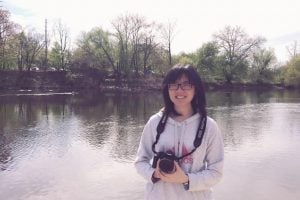
Lidan Wang, a PhD student in the Department of Electrical and Computer Engineering, has recently received the National Institute of Standards and Technology (NIST) Professional Research Experience Program (PREP) Fellowship.
The goal of the Hopkins NIST PREP Consortium (HNPC) is to contribute to the innovation and competitiveness of the future workforce by giving students the opportunity to participate in research-intensive real world educational experiences. HNPC provides a hands-on platform for undergraduate and graduate students, as well as post-doctoral fellows and academic affiliates, to work closely with NIST scientists to deepen their knowledge in advancing measurement science and technology.
“Winning this fellowship encourages me to do better research in my field,” Wang said. “I believe this program will bring me not only great resources, but also inspiration for my work. I’m glad that I have been given this opportunity.”
Wang will be working with Vishal Patel, her advisor and an ECE assistant professor, as well as her NIST mentor Jonathon Phillips, on a project related to face recognition.
More specifically, Wang’s current work focuses on developing algorithms that generate images of one domain based on another domain, when the images of the first domain are not available. An application of this is the police being able to create a digital facial image of a suspect based off a sketch provided by a witness, then comparing that image to mugshots of previous offenders to try to find a match with a high accuracy rate.
Face recognition has been studied for a long time but is still growing because there are many unsolved practical problems, which is one of the reasons why Wang is excited to be pursuing this research at Johns Hopkins.
“I like doing this research because it is related to our daily life and has many applications, especially now that security systems are almost everywhere,” Wang said. “Hopkins has a great research atmosphere and, in my opinion, the invited talks and discussions with professors and students are very helpful for our research.”